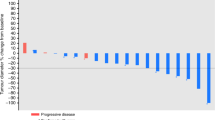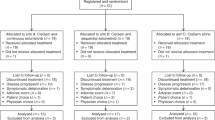Abstract
S9788 is a new triazineaminopiperidine derivate capable of reversing multidrug resistance (MDR) in cells resistant to chemotherapeutic agents such as doxorubicin. It does not belong to a known class of MDR revertants, but its action involves the binding of P-glycoprotein. Thirty-eight evaluable patients with advanced colorectal or renal cell cancer were treated with doxorubicin alone (16 patients) followed after disease progression with combination treatment of doxorubicin plus S9788 (12 patients) or upfront with the combination of doxorubicin plus S9788 (22 patients). S9788 was given i.v. as a loading dose of 56 mg m-2 over 30 min followed by doxorubicin given at 50 mg m-2 as a bolus infusion. Thereafter, a 2-h infusion of S9788 was administered at escalating doses ranging from 24 to 120 mg m-2 in subsequent cohorts of 4-10 patients. Pharmacokinetic analysis demonstrated that concentrations of S9788 that are known to reverse MDR in vitro were achieved in patients at non-toxic doses. Compared with treatment with doxorubicin alone, treatment with the combination of doxorubicin and S9788 produced a significant increase in the occurrence of WHO grade 3-4 granulocytopenia. Treatment with S9788 was cardiotoxic as it caused a dose-dependent and reversible increase in corrected QT intervals as well as clinically non-significant arrhythmias on 24- or 48-h Holter recordings. Although clinically relevant cardiac toxicities did not occur, the study was terminated as higher doses of S9788 may increase the risk of severe cardiac arrhythmias. Twenty-nine patients treated with S9788 plus doxorubicin were evaluable for response, and one patient, who progressed after treatment with doxorubicin alone, achieved a partial response. We conclude that S9788 administered at the doses and schedule used in this study results in relevant plasma concentrations in humans and can safely be administered in combination with doxorubicin.
This is a preview of subscription content, access via your institution
Access options
Subscribe to this journal
Receive 24 print issues and online access
$259.00 per year
only $10.79 per issue
Buy this article
- Purchase on Springer Link
- Instant access to full article PDF
Prices may be subject to local taxes which are calculated during checkout
Similar content being viewed by others
Author information
Authors and Affiliations
Rights and permissions
About this article
Cite this article
Punt, C., Voest, E., Tueni, E. et al. Phase IB study of doxorubicin in combination with the multidrug resistance reversing agent S9788 in advanced colorectal and renal cell cancer. Br J Cancer 76, 1376–1381 (1997). https://doi.org/10.1038/bjc.1997.563
Issue Date:
DOI: https://doi.org/10.1038/bjc.1997.563



